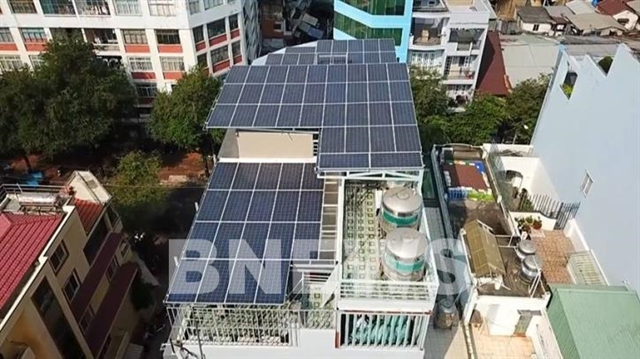 Economy
Economy

Prime Minister Nguyễn Xuân Phúc has instructed the Ministry of Industry and Trade (MoIT), localities and Vietnam Electricity (EVN), to review issues related to solar power development.

|
| A rooftop solar power project on Vạn Hoa Hotel, District 5, HCM City, constructed by Red Sun Solar Company. — VNA/VNS Photo Đức Dũng |
HÀ NỘI — Prime Minister Nguyễn Xuân Phúc has instructed the Ministry of Industry and Trade (MoIT), localities and Vietnam Electricity (EVN), to review issues related to solar power development.
In document No. 185 / TTg-CN, the PM said he has signed decisions to implement the Vietnam Renewable Energy Development Strategy to 2030.
They include decision No. 13/2020 / QĐ -TTg on the mechanism to encourage the development of solar power in Việt Nam and document No. 414 / TTg-CN in April 2020 to direct the implementation of the decision, in which MoIT and relevant ministries, branches and localities are required to strictly and transparently manage planning and investment in solar power development in Việt Nam and to fight against negativity and corruption and strictly punish any such cases.
In July 2020, the MoIT issued a circular on project development and standard power purchase and sale contracts applicable to solar power projects with specific guidelines for rooftop solar development.
According to the PM’s directive, in recent years, the development of solar power in Việt Nam has achieved many positive results and strongly attracted investment, contributing to the efficient exploitation of solar energy sources that could ensure electricity supply and security in the country.
EVN’s statistics said by the end of 2020, the total power capacity in the national power system excluding rooftop solar power reached more than 62,000 MW, of which, the capacity of solar power sources on the ground reached 8,838 MW. The rooftop solar power supply capacity was approximately 8,000 MW by the end of 2020.
However, the document said: “Uncontrolled rooftop solar power development in line with electricity demand, especially in December 2020, caused difficulties in the operation of the national power system while the COVID-19 pandemic had a strong impact on our country's economic growth, leading to a decrease in the demand for electricity.”
Due to the above factors, since last month, EVN had to develop and implement a plan to cut solar power and other renewable energy in the national power system, causing wasted social resources and anxiety among many investors, said the PM.
To ensure the development of solar power in accordance with regulations and promote overall efficiency, PM Phúc asked the MoIT to assume the prime responsibility and coordinate with the People's Committees of provinces and centrally-run cities, EVN and relevant agencies to urgently review the implementation of current terrestrial and rooftop solar power projects and to guide implementation in accordance with the promulgated mechanism and regulations.
The document also asked them to research and immediately handle unexpected problems arising in the development of solar power, especially rooftop solar power.
The document requested relevant authorities to carry out inspections and supervision of rooftop solar power development in localities and power companies to ensure compliance with regulations to rectify and handle mistakes if any, especially profiting from policies in the deployment of rooftop solar power.
At the same time, PM Phúc told ministries and people's committees to research and propose the most effective management measures for renewable energy sources, especially solar energy, avoiding loopholes.
He told MoIT, EVN and localities to develop measures to minimise the reduction of planned renewable energy sources as well as minimise the economic losses of investors and wasted renewable energy sources in Việt Nam.
Those places must be responsible for the overall review of current power sources currently deployed and update the power supply-demand balance in the future to strengthen the management and complete procedures to submit the Power Planning Project VIII to PM Phúc on schedule.
He told them to avoid massive development of solar power without a plan and lack of control, causing overloading of the regional power grid and negative consequences in the future. — VNS




